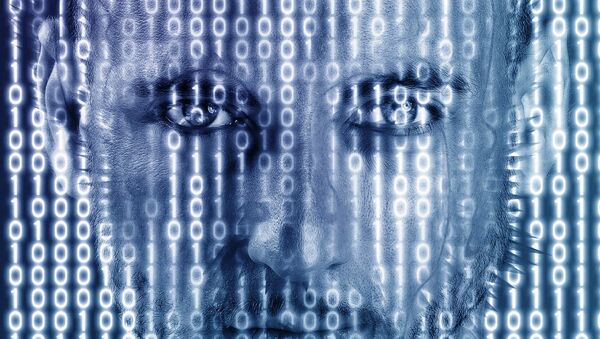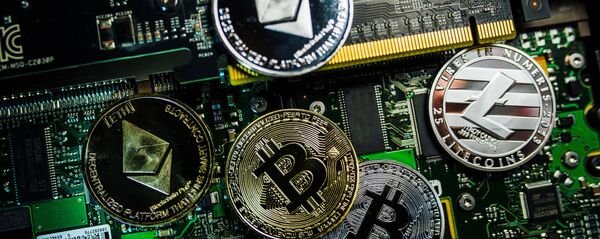Abishur Prakash discussed developments in the implementation of blockchain and how governments and private firms are set to compete over the emerging technology.
Mr Prakash is the world's leading authority on geopolitics and technology, and is a geopolitical futurist at the Center for Innovating the Future (CIF), a strategy consulting firm base in Toronto. He has also authored four books, including Next Geopolitics: Volume One and Two, Geopolitics of Artificial Intelligence (Go.AI) and The Age of Killer Robots.
Sputnik: Can you explain what a blockchain is, and why are non-monetary applications of blockchain technologies increasingly becoming a key driving factor in the tech race between global powers? Who will benefit most from such technologies and are they possible in an age of tech nationalism?
Abishur Prakash: Blockchain is a technology that is redefining connectivity. At a technical level, blockchain is a kind of “platform” that can record data in a highly secure manner, where some people refer to blockchain as “digital ledger”. This could mean many things, such as recording bank transactions or even tracking how someone is using a digital currency.
Geopolitically, blockchain is about rewiring the world. The next systems and platforms connecting people, businesses, economies and governments will be powered by blockchain, and the geopolitical and commercial stakes are huge.
There are several ways blockchain is already driving geopolitics.
Second, blockchain allows governments to boost their militaries. The European Union (EU) wants blockchain-based defense supply chains to track soldiers, weapons and more, and China is building a reward system on blockchain to “manage" its military.
Third, some nations are looking at blockchain for foreign policy. In Brazil, the Rio Branco Institute is now including blockchain and cryptocurrencies in its curriculum!
Like artificial intelligence (AI), any nation can benefit from the capabilities blockchain provides. It’s a question of vision, but at the same time, some nations are acting faster than others.
Take the US. While countries invest in local currencies to replace USD, driving de-dollarization, a separate transformation is emerging. Several US technology firms are selling blockchain to help companies and countries to manage trade.
In other words, while the world tries to move away from USD, international trade is becoming reliant on US blockchain systems! This is a new kind of geopolitical power for the US, and it’s a sign of what’s at stake.
Sputnik: A Huawei white paper in 2018 outlined new international standards being discussed to shape a regulatory framework for blockchain, citing numerous organisations in the Chinese government, the International Monetary Fund and industry alliances. Why are international consortiums necessary in moderating technologies?
There’s two levels to this. First, there’s what industry consortiums are doing, which is about guidance. As many companies are hesitant to invest large sums of money in technology they do not fully understand, consortiums are building blockchain solutions that solve specific problems. They are providing insight and expertise to businesses and is nothing new.
But, on the second level, the ground is shifting because of geopolitics. Governments and institutions are competing to decide what blockchain standards the world will follow. On this level, there’s a different set of “consortiums".
For example, in China, a National Blockchain Committee has been set up to create standards consisting of leading Chinese businesses and colleges like Baidu, Tencent and Peking University.
This matters due to a separate initiative China is working called Blockchain Services Network (BSN), which is a project launched by Beijing to connect cities, businesses and governments via blockchain.
— BSN (@bsnbase) August 31, 2020
China has global ambitions for this emerging technology, and some have equated BSN to a new Internet that connects the world in a new way. Just as today, if someone wishes to do business online, they use the Internet and tomorrow, as blockchain grows in prominence, countries, companies and cities may plug into BSN.
All of this means that as BSN spreads around the world, the blockchain standards China builds at home may become the global standard, and while China’s adversaries may not like this, they are not working on an alternative.
At the same time, some regions may not want to depend on Chinese technologies like BSN, preferring to develop their own. Or, perhaps a new coalition of nations will emerge around blockchain the same way they have with other technologies such as the Global Partnership on AI (GPAI) or D10 Alliance, who may develop their own blockchain standards.
In the near future, the world could be governed by different blockchain approaches, and in the middle of all this, for the first time, private tech firms may clash along geopolitical lines and not just commercial ones.
Sputnik: Huawei and the Beijing government are in talks to build a blockchain system directory to connect 50 city departments to share data. What kinds of data could be shared across a blockchain and how could that benefit citizens? Is there a need for ethics regulations in scrutinising such applications?
Abishur Prakash: As China rewires itself through blockchain, immense privacy and surveillance implications emerge. Under the project, all kinds of departments are being connected to the blockchain directory, from utilities such as gas, water, electricity, to parking authority to healthcare services. In many ways, these departments “govern” people’s lives.
This means, whatever people do, from being late in paying their water bill, to getting a parking ticket to being diagnosed with high-cholesterol, may be recorded on blockchain. Arguably, the Chinese government already has access to this data, but doesn’t have it all in one place or can track and update it in real time.
But once this happens, China will have a brand new capability: it could predict the lifestyle and decisions of its citizens.
This will redesign China’s social services, the role of government and the way people live, but poses two major challenges.
First, the blockchain directory could be integrated into China’s social credit system, meaning personal data may start to affect lifestyles in more complex ways. Second, by partnering on such blockchain projects, Chinese technology firms are becoming more embedded in the “new fabric” of China. This could create challenges for these firms as they expand globally.
— Lin Jing 林静 (@CGCHINA_CPT) September 4, 2020
Within all of this is a huge space and need for ethics and public policy, but again, whose ethics will the world use? As blockchain is such a new technology and doesn’t get the same attention as AI, citizens may be unaware of its implications.
This could allow some governments to quietly introduce blockchain systems without ethical oversight. To remedy this, committees and policy makers must start building a set of data ethics that defines how citizen data can and cannot be used in blockchain systems, similar to the General Data Protection Regulation (GDPR) in Europe.
Sputnik: Do you see such blockchains remaining proprietary or embracing open-source platforms? Given the nature of open-source coding for increased scrutiny, do you see governments and institutions moving to proprietary blockchains to enhance security controls? What kinds of disputes do you see in building government-level blockchains, and will there be a level of cross-national interoperability in future blockchain technologies?
Abishur Prakash: At the heart of the blockchain industry, a war is raging between de-centralized and centralized. Blockchain was initially developed for decentralized applications like Bitcoin and viewed as a way for people to remain private and anonymous, meaning blockchain was initially viewed as a “peripheral technology.”
Not a lot of people used blockchain and it was operating on the edge of society, but now the world is racing to build and deploy it. This is creating a tug of war between those who want blockchain to remain open and those who want to control it.
In the end, the blockchain systems which become dominant depends on the preferences, culture and ideology of countries and companies. Some nations may embed open source blockchain to enhance privacy, while others may do the opposite.
The same logic applies to the private sector, and, of course, interoperability will play a big role but will be driven by geopolitics. As the US, China and India decouple from each other, interoperability may be viewed differently than in the past.
This is an opportunity for some governments, namely the EU, who is calling for blockchain interoperability standards to be developed and could potentially play a leadership role in the geopolitics of technology, or what I call “Next Geopolitics”.
For example, Sweden and Thailand could partner to develop a blockchain system for healthcare to track how people are visiting clinics, what kind of conditions they are being diagnosed with, the prescriptions being handed out, and others.
It could be used to help the two build a more sophisticated healthcare system, but data could become a sour point as Sweden may want to share data blockchain system data with pharmaceutical firms and Thailand may not want this.
Many are viewing blockchain and other emerging technologies as a way to take their geoeconomic power to new heights, ultimately leading to countries clashing in areas they didn’t prepare for.
Sputnik: Let's use a case scenario such as a data breach. What sort of security mechanisms would blockchain have in place to protect data privacy from both state and non-state actors? Given current concerns over cryptocurrency hacking, is blockchain as reliable as current data sharing technologies and if so, how can governments and institutions speed up their adaptation?
Abishur Prakash: There are strangely many security concerns with blockchain, despite blockchain once being considered highly secure or even unhackable. In the US, researchers analyzed a blockchain-based voting app called “Voatz” loaded on smartphones and found that through exploits, hackers could actually take over a user’s smartphone and change votes.
— Alex Rice (@senorarroz) September 3, 2020
Or, look at Coinbase, one of the world’s largest crypto exchanges, where a blockchain recording transactions was breached after hackers gained control of an Ethereum variant and altered transaction records in order to steal money.
Despite this, such kind of hacking and breaching is nothing new, meaning blockchain systems and companies may have new opportunities to take data privacy to new heights. For example, storing data in DNA is an emerging area. Could storing data in the human body be a way for blockchain systems to function?
At the same time, as many blockchain systems are being developed to be centralized, it means a single authority will control it. What kind of backend will exist? This is a big fear around digital currencies, as governments may be able to track people’s financial activity in real time around the world.
Alongside all of this, we haven’t seen consumer-based blockchain services emerge that millions of people have adopted. But, this isn’t far off as technology firms become more powerful than ever before.
There is already paranoia about this, especially regarding social media companies and their ability to decide what content to remove or flag. These fears will only exacerbate as technology firms offer blockchain to the world. Will people trust these companies and how their data may be collected and used?
For more information, visit https://abishurprakash.com or follow on Twitter at @AbishurPrakash.






